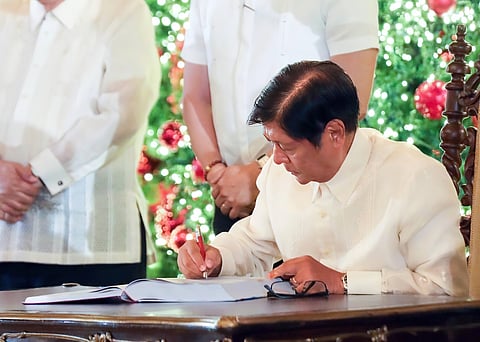
- NEWS
- the EDIT
- COMMENTARY
- BUSINESS
- LIFE
- SHOW
- ACTION
- GLOBAL GOALS
- SNAPS
- DYARYO TIRADA
- MORE

Ten days after its original scheduled signing, President Ferdinand Marcos Jr. enacted into law the General Appropriations Act (GAA), or Republic Act 12116, for 2025.
The GAA outlines the national budget for Fiscal Year 2025, covering the government’s projects, operational expenses, and other programs.
The original budget proposal was for P6.352 trillion, but this was reduced to P6.326 trillion after President Marcos vetoed line items deemed “inconsistent with the country’s development plan and unresponsive to the needs of the people.”
“After an exhaustive review, we have directly vetoed over P194-billion worth of the line items that are not consistent with our programmed priorities. These include allocations for certain programs and projects of the Department of Public Works and Highways, and those under the Unprogrammed Appropriations, which increased by 300 percent,” he said.
Conditional implementation
Additionally, the government will implement a “conditional implementation” for certain items in the national budget. This includes the Ayuda sa Kapos ang Kita Program (AKAP), which requires the establishment of clear guidelines for its proper execution.
Concerns over the AKAP arose, especially the potential misuse of its funds with the 2025 midterm elections approaching.
President Marcos emphasized that the guidelines for AKAP’s implementation will be “strategic, leading to the long-term improvement of the lives of qualified beneficiaries, while ensuring that funds are protected from misuse, duplication and fragmented benefits.”
“This approach is grounded on a simple yet profound truth: the appropriation of public funds must not break the public trust,” he stressed.
In addition to AKAP, other programs subject to conditional implementation include the DSWD-OSEC special provisions for the Payapa at Masaganang Pamayanan Program, the definition of basic infrastructure programs under the DPWH OSEC, and the payment of retirement benefits and pensions under the Office of the Ombudsman, among other special provisions.
No reverting to reenacted budget
Prior to the budget signing, lawmakers and stakeholders urged the President to return the budget proposal to Congress and reenact the 2024 budget for the following year. Marcos, however, disagreed, stressing that it would set the country back and hinder economic progress.
“This is not an option we can afford. A reenacted budget will delay our vital programs, jeopardize economic growth targets, and undermine our goals of achieving single-digit poverty levels and upper-middle-income status,” he said.
As a result, Marcos exercised his veto power, in accordance with Article VI, Section 27 of the Constitution, which grants the President the authority to exercise a line-item veto in appropriation, revenue, or tariff bills.
Vetoed items
Shortly after the budget signing, the President’s economic team held a press conference to explain the decisions behind the vetoes.
During the holidays, Marcos met multiple times with his economic team to review the budget proposal line-by-line. Key officials in these meetings included Executive Secretary Lucas Bersamin, Budget Secretary Amenah Pangandaman, Finance Secretary Ralph Recto, Public Works and Highways Secretary Manuel Bonoan, and National Economic and Development Authority Secretary Arsenio Balisacan.
Pangandaman outlined the vetoed items in the 2025 budget, explaining that they did not align with the administration’s priorities. Notably, P26 billion allocated to the DPWH was directly vetoed, along with P168 billion in unprogrammed appropriations.
DPWH Secretary Bonoan explained that the vetoed projects were not fully aligned with the government’s eight-point socio-economic agenda and required additional scrutiny. “These are projects that are not ready for implementation at this point, so we deferred them,” he said.
One of the controversial aspects of the budget was the allocation of funds. While the DPWH received a higher budget than the Department of Education (DepEd), it is important to note that the DPWH’s budget is not entirely allocated to the education sector, but rather to broader infrastructure initiatives.
Budget Secretary Amenah Pangandaman clarified the DepEd retained its overall budget, including a P12 billion reduction. However, she assured that if additional funds are needed in the coming fiscal year, the Department of Finance will provide support to the agency.
Of the P12-billion cut, P10 billion had been earmarked for DepEd’s Computerization Program. President Marcos had previously pledged to reinstate the funds to the department if necessary.
Zero budget for PhilHealth stays
Pangandaman confirmed that there was no allocation for the Philippine Health Insurance Corporation (PhilHealth) in the GAA, as proposed by the bicameral conference committee. The committee, consisting of lawmakers from both chambers of Congress, decided not to allocate funds to PhilHealth since it had surplus funds.
Finance Secretary Ralph Recto supported this decision, noting that PhilHealth has a sufficient operating budget.
“Congress made this decision because PhilHealth’s corporate operating budget is adequate. They have reserved funds of approximately P280 billion, a surplus of around P150 billion, and investments totaling more than P400 billion. They are projected to earn P200 billion in 2025 and spend P150 billion, which means their surplus will increase by P50 billion. So, they have more than enough resources,” he explained.
Recto assured that the DoF will closely monitor PhilHealth in 2025 to ensure the proper utilization of its funds.
